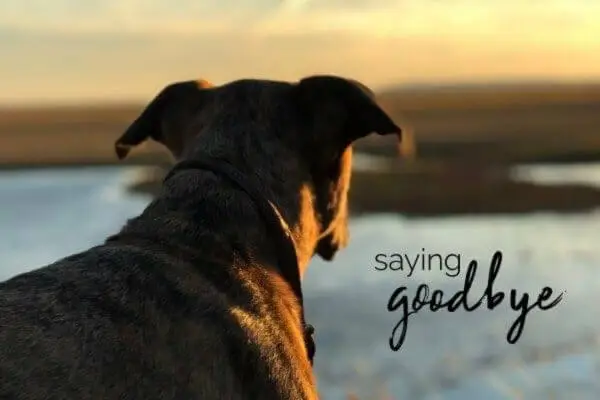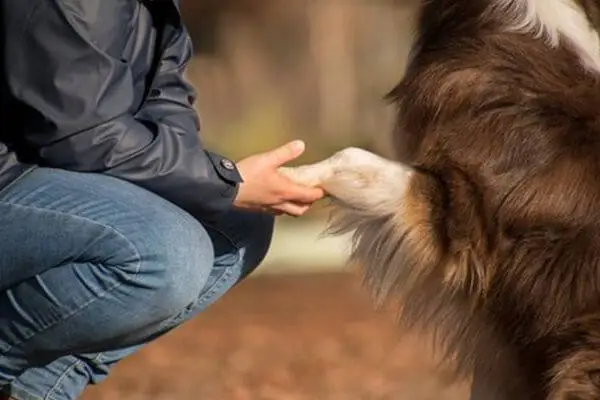Loss of a dog is an intensely challenging situation.
Saying goodbye to your loyal companion can be one of the most heartbreaking experiences in life. Our pets often become cherished family members, and their absence can leave us feeling incomplete.
Everyone has different ways to cope with grief, but some tried-and-true methods have helped people recover from their loss. In this article, we’ll share advice on how to deal with the devastating impact of losing your beloved dog.
We hope you find comfort and solace in these words and begin down the path toward healing.
Saying Goodbye To Your Dog
Losing a beloved dog is an emotionally challenging experience many pet owners inevitably face. Dogs become cherished members of our families, offering unwavering loyalty, love, and companionship. When it comes to saying goodbye to your dog, it can be a heart-wrenching process filled with grief and sadness.
However, it’s important to remember that this farewell also presents an opportunity to honor and celebrate the special bond shared with our four-legged friends by saying goodbye to your dog.
Saying goodbye to a dog is a deeply personal journey. Each person experiences and processes grief differently. Some find solace in creating a meaningful memorial to honor their furry friend. Creating this could involve:
- Planting a tree in their memory.
- Crafting a personalized tribute.
- Even setting up a dedicated area with photographs and mementos.
These acts of remembrance serve as tangible reminders of our dogs’ profound impact on our lives, allowing their memory to live on.
During this challenging time, seeking support can be incredibly beneficial. Connecting with others who have experienced a similar loss, such as joining pet loss support groups or seeking counseling, can provide a sense of understanding and comfort. These resources offer a safe space to share stories, express emotions, and gain insight into coping strategies.
Surrounding yourself with individuals who empathize with your grief can alleviate some pain and help you navigate the complex emotions that arise when saying goodbye to a dog.
For families with children, explaining the concept of loss and helping them cope can be particularly challenging. It’s important to provide age-appropriate explanations, using simple and gentle language to help them understand that their furry friend is no longer physically with them.
Encouraging children to express their feelings through drawings, writing letters, or creating a memorial collage can provide a healthy outlet for their emotions. Additionally, reading books about pet loss together can offer comfort and catalyze conversations surrounding grief and healing.
Amid the sorrow and pain of saying goodbye to a dog, it’s crucial to remember that healing takes time. Each person’s journey is unique, and there is no right or wrong way to grieve. It’s okay to experience various emotions, from sadness and anger to fond memories and eventual acceptance. In time, the raw ache of loss can gradually transform into a bittersweet appreciation for the joy and companionship that our dogs brought into our lives.
Saying goodbye to your dog is a complicated process, but it is also an opportunity to reflect on the immense love and happiness they brought. Through creating memorials, seeking support, and allowing ourselves to grieve, we can honor our furry friends’ legacies and cherish the memories that will forever remain in our hearts.
Coping with the Loss of a Dog: Honor Your Beloved Dog’s Memory
Honoring your beloved dog’s memory is integral to the grieving process. Losing a dog can be challenging to know where to start, but it doesn’t have to be overwhelming.
Acknowledge your emotions and give yourself time to grieve. Allow yourself to feel sadness, anger, guilt – whatever comes up.
You can create a photo album or scrapbook filled with pictures and mementos from throughout your furry friend’s life.
Also, consider writing down some of those special memories so that you can look back while processing the loss of your dog. If there was something specific that you always did together, then try doing it once more as a way of tribute before letting go when ready.
And don’t forget about things like creating a memorial online or planting a tree in their honor – these gestures are often significant for you and other family members involved.
When it feels right, find ways to celebrate your dear pup’s impact on your life rather than dwelling on the goodbye forever element of the situation; this will bring positive closure and ensure their legacy lives on no matter what.
Take Time to Grieve: Healing after the Loss of a Dog
Painful pangs of pet loss can be particularly profound. When a beloved four-legged friend passes away, it is essential to acknowledge and accept the feelings that come with it.
For many, grief will begin even before the dog has passed – for instance, when there are signs that their health is declining or if their owners have put them down due to old age. Whatever form your pain takes, it’s essential to grieve and adequately process your emotions.
The healing journey after losing a furry companion can look different for everyone; however, having support throughout this challenging period is critical. It may help to share stories and experiences with friends, family members, or colleagues who understand what you’re going through and seek professional advice from experts such as counselors or therapists.
Online forums and social media groups can also provide an outlet where people who have experienced similar losses can connect and offer comfort during this challenging stage.
Making physical and mental space for yourself will allow you to be present in your grief without being overwhelmed by it.
It could involve setting aside some quiet time each day for reflection, engaging in activities like journaling, practicing mindfulness techniques, or taking up a new hobby that helps keep memories alive.
Finding ways of honoring the memory of your canine friend can also contribute towards healing over time; creating photo albums, planting trees in their name, or holding memorial services are just some simple yet meaningful ways of paying tribute while coming to terms with the loss.
Ultimately, allowing yourself the necessary time and space to move forward at one’s own pace is paramount on this emotional journey ahead.
Connect With Other Pet Owners: Shared Experiences in the Loss of a Dog
After taking the time to grieve appropriately, connecting with other pet owners is an excellent way of honoring your beloved dog. It can be challenging to open up about your emotions and feelings regarding their loss, but it can also provide an outlet for healing.
Here are four ways you can connect with others who have gone through similar experiences:
- Join a local or online pet bereavement support group – such groups offer a safe space where individuals share stories and advice on coping with a pet’s loss. This community setting allows members to find comfort in knowing they’re not alone in their grief.
- Speak to friends and family – if you don’t feel comfortable discussing your emotions within a support group setting, talking openly with close family and friends may help. They will likely understand what you’re going through and be willing to listen without judgment when needed.
- Set aside time each day to remember them – take some time out of your daily routine to think about all the beautiful memories shared between you and your beloved dog. You could write down fond thoughts or reflect on happy times spent together before they passed away.
- Adopt another dog (if possible) – while there is no replacing your lost pup, adopting another animal companion may bring new joy into your life when done right; make sure you give yourself enough time after grieving before making any decisions here!
Regardless of whether or not you choose one (or more) of these options, know that every person’s journey towards healing from the loss of their cherished pet looks different—give yourself grace during this process and allow yourself however much time it takes until you reach closure again.
Reach Out to a Professional: Seeking Help for the Loss of a Dog
Saying goodbye to your dog can be a challenging and heartbreaking experience. Every person will handle the loss of their dog differently, but it is essential to seek help if needed.
Speaking with family members or friends who have also lost a pet can provide solace during this time. If these conversations don’t feel like enough, consider contacting mental health professionals who specialize in helping people cope with grief. These specialists are experienced in providing strategies for coping with such losses and offer support that could prove invaluable when dealing with your unique situation.
Having someone outside of your close circle to talk to about what you’re going through may be just the thing you need after experiencing such a tremendous loss. The grieving process for any significant loss is often long-term, so finding healthy outlets to express yourself without fear of judgment is essential.
Writing down thoughts and feelings in a journal can be therapeutic and clarify how best to move forward from such sorrows. Going for walks or engaging in activities that bring joy beyond memories of your lost pup can aid in restoring balance and comfort while easing the burden of guilt that often accompanies these situations.
Whichever route you choose – whether seeking professional guidance or simply taking time to reflect – know that healing takes time, and there’s no right way to grieve over the passing of one’s companion animal. Give yourself permission to take whatever steps necessary towards recovery at your own pace; allowing yourself moments of peace amidst heartache provides hope for brighter days ahead.
I can also recommend watching/hearing the podcast of Dr. Huberman about the process of healing from grief; it has terrific insights, such as avoiding counterfactual thinking, that is, ruminating about what things could have been done differently, which ultimately brings us more misery than necessary on this hard times.
Saying Goodbye To Your Dog Through A Memorial
Creating a memorial for your beloved pet is integral to the grieving process. It can be helpful to take the time to reflect on all the precious moments and memories you shared with them while helping you come to terms with their loss. Embracing your emotions at this difficult time will help you recognize that it’s okay to feel sad or angry but also let go of some of the guilt that may arise when something like this happens.
One way to create a meaningful memorial for your dog is by sharing stories about them and creating something tangible that honors their life. You could make an album filled with pictures and mementos from throughout their life or write a poem in tribute to them – there are many creative outlets available if this resonates with you.
If writing isn’t quite your thing, why not pick out one particular item related to your pet, such as their collar or favorite toy, and display it somewhere in honor of them?
During times like these, it’s important to remember how much joy they brought into our lives and celebrate what made them so unique. Try talking to friends who knew your pup well, too; hearing stories about them can bring much comfort. Alternatively, even if no one else had the privilege of meeting them, simply speaking aloud about all they meant to you can prove therapeutic.
No matter what kind of memorial you decide upon, know that taking steps toward honoring the memory of your beloved dog will ultimately help you move forward positively in the coming weeks and months ahead. Taking part in activities that involve reflecting badly on happier days spent together can provide great consolation and strength during this challenging period – giving us permission to grieve, heal, and eventually look back more positively on those cherished memories we created.
Frequently Asked Questions
How Long Does It Take To Get Over The Loss of a Dog, A Beloved Pet?
It’s hard to put a timeline on grief, especially when saying goodbye to your dog. Everyone’s grieving process will be different, and no one can tell you how long it’ll take to get over your loss.
That said, there are some things that you can do to memorialize your pet and help speed up the healing process. From displaying mementos or pictures of them around your home or making donations in their memory – these acts of remembrance can go a long way towards helping with your emotional recovery.
How Can I Keep My Memories Alive After the Loss of a Dog?
Consider setting up a memorial in their honor and creating traditions to keep their spirit alive for years. You could even start a few pet projects as part of their legacy, such as planting trees or helping an animal rescue group.
Remembering your beloved dog will bring joy while ensuring they never leave your heart.
Is It Normal To Feel Angry After the Loss of a Dog, Your Beloved Pet?
It’s normal to feel angry after the death of a pet; it’s part of the grieving process.
Many people find themselves experiencing moments of intense anger, often directed at those they perceive as being responsible for their loss or even God if they are religious.
What Kind of Support Should I Seek When Coping With the Loss of a Dog?
At times like these, it can be hard to know where to turn as you struggle with pet loss. But seeking solace and expressing grief are essential steps in the healing process.
Many people find comfort in support groups for those who have lost a beloved pet; some even offer online options for convenient access during this challenging adjustment period. Here, you’ll have an opportunity to talk about your feelings without fear of judgment from family or friends who may not understand what you’re going through. Also don’t hesitate to get support from your pets, families and even profesional conseulors
How Do You Say Final Goodbye To a Pet?
- Spend quality time: Allocate dedicated moments to be with your pet, expressing love, gratitude, and comfort in their final days or moments.
- Create a peaceful environment: Ensure your pet is comfortable and surrounded by familiar things, such as their bed or favorite toys, in a calm, quiet space.
- Consider euthanasia: If your pet’s quality of life has significantly deteriorated, consulting with a veterinarian about euthanasia may be a humane choice to relieve suffering.
- Say your goodbyes: Take the time to speak to your pet, expressing your love, thanking them for the joy they brought, and assuring them that it’s okay to let go.
- Consider aftercare options: Decide whether you want to bury your pet in a particular place or opt for cremation. Research available services or consult with your veterinarian for guidance.
Conclusion
It’s natural to feel a profound loss when our beloved pet dies. Grieving can be an intense and confusing process, but it is essential to remember that you are not alone in your feelings.
We must take the time to honor the life we shared with our furry friends and find ways to keep their memory alive. With support from family, friends, or even professional counseling, anyone who has lost a beloved pet can learn how to cope and eventually move forward.
Please consider donating to a rescue organization, such as Bone Voyage Dog Rescue, in memory of your dog; when you donate, you can write to whom you are dedicating the donation. Otherwise, you can volunteer with us locally at Ajijic, Jalisco, or remotely; you can also look for volunteer options at your local shelter.
If you know someone interested in adopting a dog, please refer to your friend Bone Voyage Dog Rescue; inhere, we rescue street dogs from Mexico and find them loving homes in the USA and Canada. We give them all the necessary healthcare and manage the transport considerations to fly the dogs to the USA and Canada. You can have a look at our adoptable dogs here.



